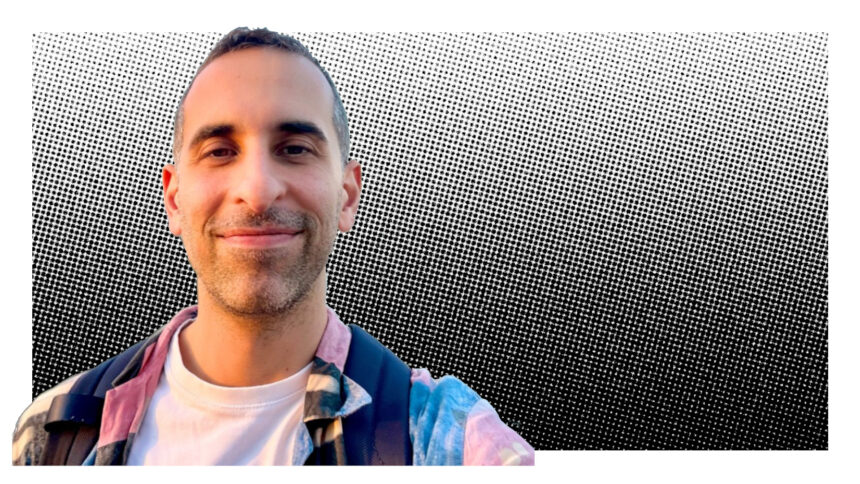The Swedish government wants to make paying for sexual services online a criminal offense. The law could have global implications for online services and put creators at risk, warns Yigit Aydin. He fights for the rights of sex workers on behalf of the association ESWA.
 The narrative of protection through criminalization is misleading, says digital rights expert Yigit Aydin. – Alle Rechte vorbehalten Photo: Yigit Aydin; montage: netzpolitik.org
The narrative of protection through criminalization is misleading, says digital rights expert Yigit Aydin. – Alle Rechte vorbehalten Photo: Yigit Aydin; montage: netzpolitik.orgWatching others masturbate online for money? This could soon be banned in Sweden. The conservative-right government of Prime Minister Ulf Kristersson has introduced a bill to parliament that would make it a criminal offense to pay for sexual services “performed at a distance, without contact.” Parliament is currently debating the bill and is set to vote next week.
It would be an extension of the “Swedish model” that has been in place since the 1990s: sex work itself is not a crime, but clients are criminalized. The model would now apply not only to physical contact, but also to online services.
According to the draft, anyone who “induces a person to perform or tolerate a sexual act in return for payment, in order to participate in it or to have it performed for them” would be liable to prosecution. Merely watching someone undress in front of a camera would still be permitted, as would the purchase of porn films. But anyone who pays models directly for “sexual acts” in front of a camera would be liable to prosecution. This can be the case with live streams via webcam or when ordering individual content on platforms such as OnlyFans.
Yigit Aydin is Senior Program Officer at the European Sex Workers‘ Rights Alliance, or ESWA for short, a sex worker-led network representing more than 100 organisations in 30 countries across Europe and Central Asia. The association is currently gathering supporters to prevent the law from being passed. Criminalizing consensual sex work does not protect sex workers, Aydin says. Instead, he warns of devastating consequences, not only for sex workers and their families, but for sexual services on the internet in general.
„The idea that the worker is not criminalised is a legal fiction“
netzpolitik.org: The proposed law is not directed against sex workers, but against clients who pay for sexual services online. Why is your association calling for the law to be stopped?
Yigit Aydin: The so-called „Swedish model“ is often misunderstood as a progressive, protective approach to sex work. While it claims to decriminalise the sex worker and only criminalise the buyer, in practice it punishes sex workers in deeply harmful and systemic ways. When the purchase of a service is criminalised, the service itself becomes impossible to offer safely. The workers lose clients, income and are forced into more precarious or hidden conditions, increasing their risk of violence, exploitation, and isolation. This regulation does not eradicate sex work. It pushes the workers into unsafe conditions. The idea that the worker is „not criminalised“ is a legal fiction.
netzpolitik.org: How would the proposed law affect people who earn their living in Sweden through webcamming or other online sexual services?
Yigit Aydin: This law criminalises one of the few safer, lower-barrier forms of sex work: digital erotic labour. It will push workers based in Sweden out of a sector where they can work independently, set boundaries, and avoid the risks associated with street-based or in-person work. The consequences will undoubtedly include loss of income for those who rely on digital work as a primary or supplementary source. We will also see increased isolation, as clients and platforms distance themselves out of fear. There will also be increased stigma and surveillance, especially for trans, disabled, migrant and racialised sex workers.
netzpolitik.org: Some Swedish sex workers have already announced that they will leave the country if the law comes into force.
Yigit Aydin: While some sex workers are going to try to move their work abroad or anonymise themselves further, others who do not have the freedom to simply “exit” or leave the country will have to take the chance on working under increased criminality.
netzpolitik.org: On platforms such as OnlyFans and cam sites, people from all over the world offer content that is also consumed in Sweden. What international implications could the law have?
Yigit Aydin: This law will have international implications far beyond Sweden. Even though the legal reach is national, platforms used by Swedish users are global. To avoid liability, platforms will ban all users in Sweden, including those who only consume content. They will deplatform or shadowban workers who appear Swedish, or who accept Swedish currency or payment providers and they will adopt broader content moderation policies that penalise erotic content creators globally.
This law also fuels a growing international trend of platform censorship and sexual expression policing, often under the pretext of “protection” or anti-trafficking. It emboldens repressive internet policy and harms digital rights for everyone.
„The enforcement will inevitably rely on expanded digital surveillance“
netzpolitik.org: The law criminalizes payment for certain content like „sexual acts“ while allowing pre-recorded porn or simply watching someone strip. How do you expect this to be enforced?
Yigit Aydin: The enforcement will inevitably rely on expanded digital surveillance, including monitoring of online communications, financial transactions, platform activity and potentially even private messages. This is the only way to determine whether a sexual act was “performed remotely” and “purchased,” so law enforcement would need to investigate interactions that occur in private digital spaces like cam sites, subscription platforms, peer-to-peer chat apps or encrypted messaging services.
netzpolitik.org: What role will adult content platforms play in all this?
Yigit Aydin: Platforms will likely start geo-blocking users in Sweden or terminating Swedish content creators’ accounts. We will see a pre-emptive banning of erotic content, even beyond what the law mandates and tightening terms of service to prohibit even suggestive or ambiguous content.
Given the law’s vague language, hinging on intent, compensation, and whether someone was “induced” to perform an act, platforms may take the most risk-averse approach: blanket bans and over-censorship. This disproportionately affects small creators, sex workers, and marginalised communities who depend on those platforms for income. It also threatens digital expression more broadly, as platforms are incentivised to censor rather than litigate.
We also expect that this law will lead to increased police monitoring of adult content platforms, pressuring tech companies and payment processors to share user data, use of sting operations and entrapment in online environments. This would have a chilling effect on any digital content that could be interpreted as sexually suggestive. This will create a dangerous precedent where the Swedish state can justify surveillance of consensual adult activity under the guise of protection. The blurred line between sex work and pornography, which even the government acknowledges, adds to the risk of overreach and misapplication.
„Sex workers have had their partners or housemates prosecuted for pimping“
netzpolitik.org: In 2018, during Donald Trump’s first term in office, the US passed a law called SESTA/FOSTA punishing platforms that facilitate sex work. How does Sweden’s approach resemble the US model?
Yigit Aydin: This proposal resembles SESTA/FOSTA a lot. Both laws expand criminal liability to platforms and third parties facilitating sex work, frame themselves as anti-trafficking while failing to distinguish between consensual and exploitative acts. This results in widespread deplatforming, censorship and digital exclusion of sex workers. They both are designed to push workers offline into more dangerous environments, especially for LGBTQI+, racialised and migrant communities and undermine access to safety tools, screening resources, and income.
The difference is that Sweden’s law explicitly targets remote, digital sexual acts, which SESTA/FOSTA indirectly affected. Sweden is taking it a step further by criminalising clients for watching cam shows or subscribing to erotic content, criminalising not only the transaction, but the medium of digital sexual expression itself. If passed, this would make Sweden the first country in the world to extend Nordic Model-style client criminalisation into cyberspace, setting a deeply harmful precedent.
netzpolitik.org: What consequences does the criminalization of offline sex work already have for sex workers in Sweden today?
Yigit Aydin: Our members have had their husbands, partners or housemates prosecuted for pimping, simply because they live together and share expenses. The government argues that anyone living with a sex worker is „benefiting“ from the proceeds of sex work. This results in terrifying raids, family separations. The reality is clear: The Swedish model does criminalise sex workers, directly and indirectly. This rhetoric of protection is not just misleading, it obscures the real pain, fear and injustice experienced daily by those it claims to defend. That narrative has to change.
netzpolitik.org: What does ESWA hope to achieve now?
Yigit Aydin: Our campaign and joint statement were signed by over 1,500 civil rights organisations, human rights experts, and academics globally, calling for the rejection of this law proposal. Once again, we call Swedish members of the parliament to reject this harmful proposal in its entirety.
Die Arbeit von netzpolitik.org finanziert sich zu fast 100% aus den Spenden unserer Leser:innen.
Werde Teil dieser einzigartigen Community und unterstütze auch Du unseren gemeinwohlorientierten, werbe- und trackingfreien Journalismus jetzt mit einer Spende.







